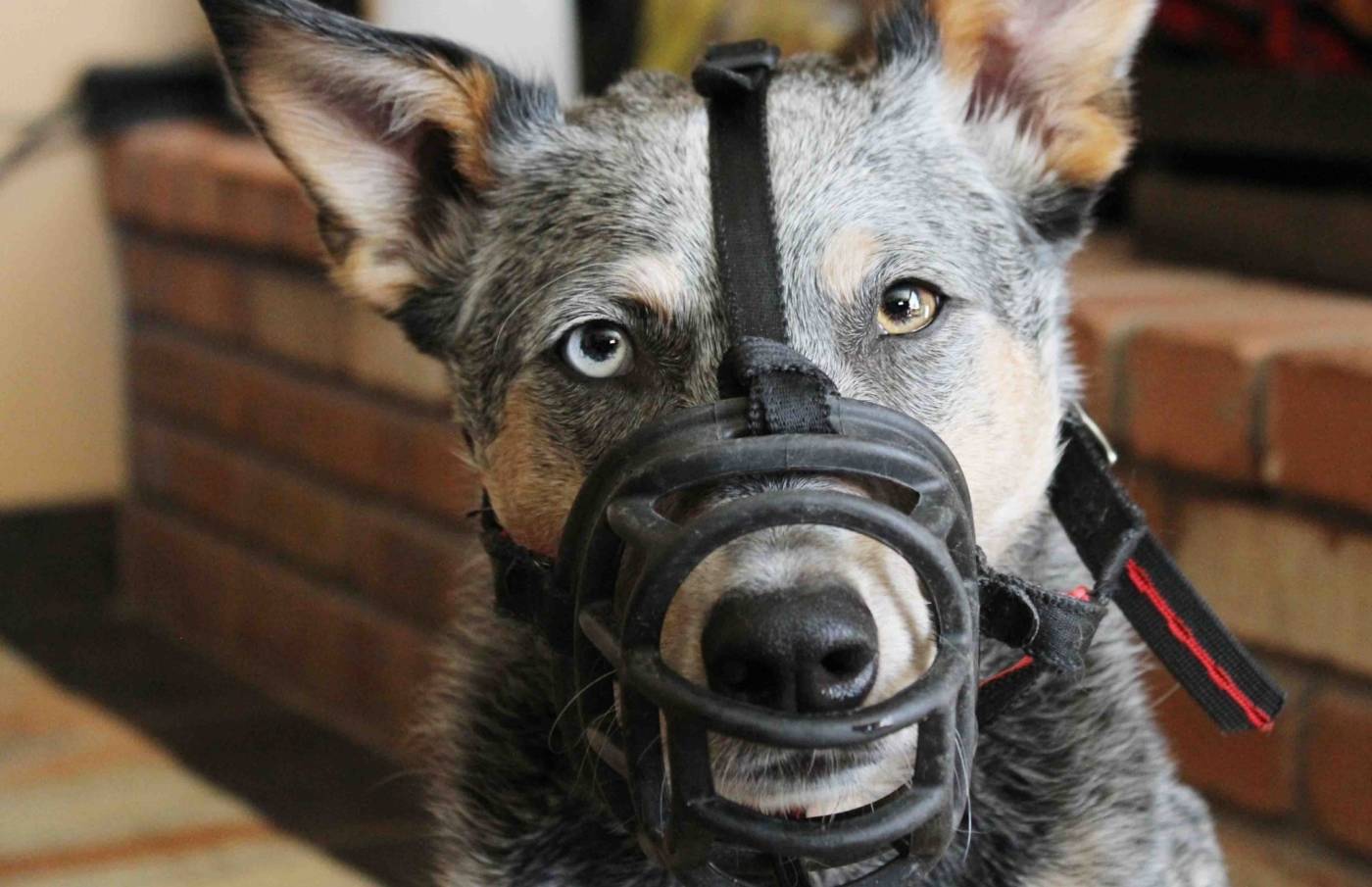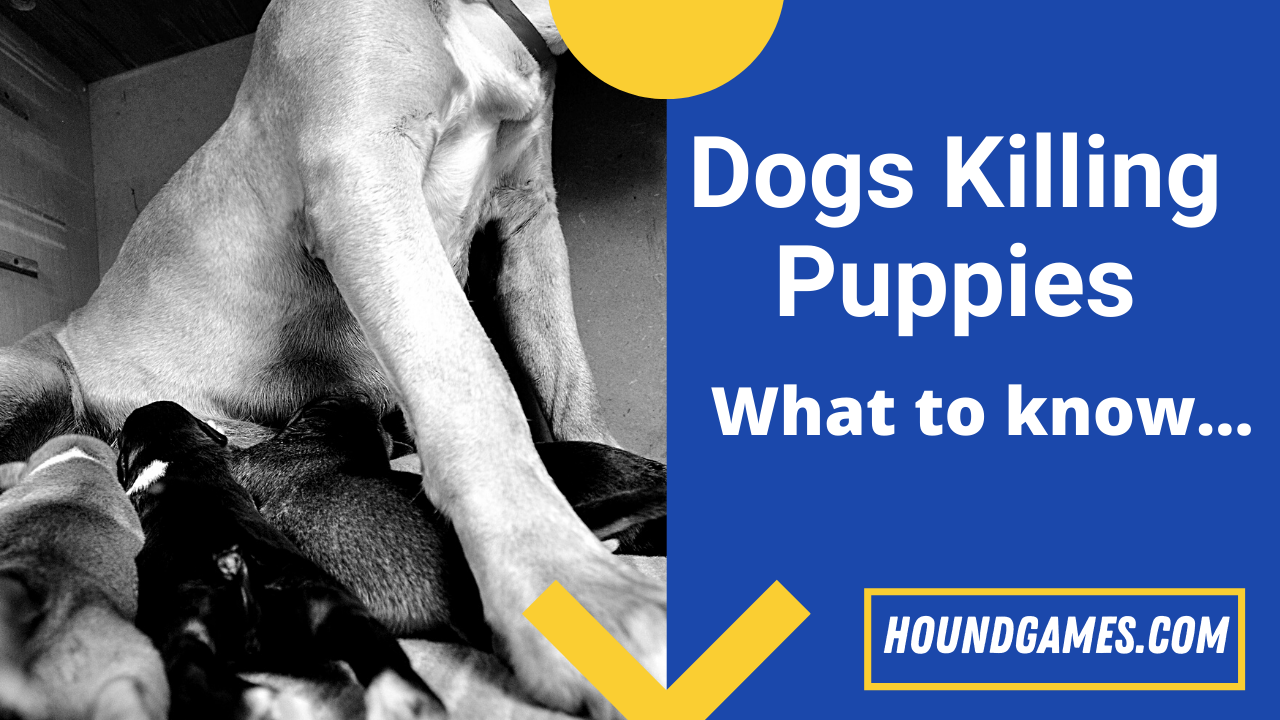Many people believe that dogs may attack puppies, either their puppies or the puppies of another dog. But how much truth is there to this belief? Are dogs generally violent towards puppies? What is the likelihood that a dog will kill a puppy? Will a mother kill her puppies? And, finally, why may a dog kill puppies?
Do dogs kill puppies?
Dogs do kill puppies, but intended puppy killing is extremely rare. In general, the question is more nuanced than whether dogs are prone to killing a puppy. In the vast majority of cases, even unsocialized dogs who can be aggressive with adult dogs will grudgingly tolerate a puppy.
They may not like it, but they can often learn to accept a puppy. Puppy pheromones, as well as an instinct to protect, usually give puppies some protection even with the grumpiest of adults.
Actual ‘attacks’ from an older dog against a young one are almost always called a “correction”. This is a show of irritation by a grumpy older dog whose space is being invaded by a boisterous puppy. For example, if the puppy has misread a situation or overstepped a boundary, the adult dog may snarl, nip, or pin the puppy to the ground.
If the correction is mild (just a bit of growl and a snap), you can allow your older dog to set their boundaries, so long as the behavior does not escalate. After all, it can be helpful if your puppy learns canine manners too, such as not to jump on an old dog that may have arthritis and find it painful.
Punishing an older dog for setting a reasonable boundary can induce anxiety and create further issues in the pack. However, as a pet parent, your job is to carefully monitor this kind of behavior and gauge the severity.
On the other hand, there are times when you need to step in and consider separating the older dog from the younger. An older dog may take to bullying a puppy or “corrections” can be too severe, even breaking the skin.
Even if the intent here wasn’t to kill, an overly domineering adult dog can cause psychological damage, leading a puppy to grow up insecure or fearful. This can impede a puppy’s social and mental development and create anxiety or aggression issues later in life.
There is also the consideration of a mother killing her puppies and why address shortly.
Why do dogs kill their puppies?
Dogs have complex social lives, and many factors influence their behavior toward each other. Several circumstances surrounding a dog’s interaction with a puppy will determine if they feel they have a reason for aggressive behavior.
Reactive dogs who feel territorial, or are anxious about losing resources may attack a puppy. In some cases, dogs can be so genetically predisposed to aggression, such as fear aggression, or so severely aggressive with other dogs in general, that they may attack puppies. For this reason, a dog that has a history of aggression with other dogs should be kept away from puppies. Unless, of course, a professional is present to assess and monitor the integration process.
Even if the adult dog’s intention is not to kill the puppy, a dominant older dog can often be so threatening that they will damage the puppy’s social development.
Mother dogs killing their puppies (and sometimes eating them)
A mother may also kill her puppies if she senses there is a genetic defect or congenital anomaly with one of them. If she is stressed, or gives birth under stressful conditions, she may also kill her puppies.
Other considerations are if she is in pain or has hormonal imbalances. Owners should always watch a mother and her puppies carefully. While uncommon in a domestic situation, it does happen.
If you suspect your mother dog isn’t taking to her puppies or is showing any signs of aggression, then you should consider using a muzzle. You can also move the puppies to a warm location away from their mother, and return them for feeding.
If signs of aggressive behaviors continue, then it’s best to bottle feed the puppies and potentially find a surrogate mother for them.
Mother dogs will also sometimes do the unthinkable and eat one of their puppies. This will likely occur if one of the puppies in the litter has a congenital defect, and so the mother will kill that puppy and then consume it for nutrients. It also removes the risk of bacteria from the deceased puppy from the area.
It’s important for all mother dogs to be provided a quiet, stress-free area for birthing and raising their pups.
If a mother dog is provided this and still has killed her puppies, then spaying is the best option to prevent further breeding.

Accidental puppy deaths from mother or father
Sometimes, a mother dog killing a puppy is purely accidental or situational and it happens while the puppies are still in the neonatal phase. For example, some mother dogs may step on or lay on their puppies and kill them accidentally.
An overwhelmed, stressed, or under-experienced mother dog may kill her puppies by biting them, and not meaning to cause death.
The mother may also push away or refuse to nurse puppies that are sick or who are not thriving. Unfortunately, infanticide does happen with mother dogs, and new moms should be monitored, especially if they are a large or heavy breed.
Why do male dogs kill puppies?
A 1982 study on wild dogs found that males are more likely to kill puppies in their pack during the dry season when food is scarce. That matches up with the behavior seen in packs of stray dogs, lending credence to the idea that male dogs may kill pups for the greater good of the pack.
It also explains why domestic male dogs rarely deliberately kill puppies. With most of their needs met by their owners, dogs don’t need to keep numbers low to prepare for a scarcity of resources.
However, this doesn’t mean a male dog won’t kill a puppy. If the dog is extremely territorial or has known aggression issues with other dogs, it can pose a risk to puppies.
However, male dogs may usually wait until the puppy reaches puberty before problems arise. For this reason, with many breeds that have a history of being dominant toward other dogs, it is best to introduce a female puppy to an adult male.
Two adult dogs of the same gender can be problematic, especially if they are not a particularly social breed. This can include dogs like Alaskan Malamutes or Japanese Akitas.
Neutering is also always the best option, as it can lower the chances of aggression in male dogs. Dogs should always be fully socialized to help the cause. Well socialized and neutered male dogs (particularly those that come from social breeds like Huskies or Golden Retrievers) should not pose a risk to puppies.
Why do dogs attack other puppies?
The reason that dogs attack other puppies, those from ‘outside’ of their pack, is not as many people believe, to thin the competition for their own young.
Killing young is far more common in cats. Male domestic cats are territorial and solitary.
A male cat will kill other cat’s kittens, not only to ensure the success of his progeny but to decrease the competition he will have to face in the future. It’s not because cats are mean and dogs are kind. It comes down to the fact that dogs are pack animals.
Pack animals live far more nuanced social lives, and for domestic dogs, there is little incentive to seek out and kill other dogs’ puppies.
Why did my dog kill my puppy?
There are several reasons a dog may kill a puppy, but the most likely answer is that your dog is poorly socialized and has become extremely territorial or aggressive. Socialization is one of the most important factors in a dog’s psychological development.
It may sound like a rather specific activity for it to play such a huge role in your dog’s mental health, but keep in mind that your dog is, before all else, a social animal. And dogs need to learn social skills during the critical socialization window, just like children need to learn social skills. A lack of socialization may result in dangerous levels of aggression or reactivity.
If a puppy is killed deliberately, it indicates a deeper behavioral problem. Certain dogs may inherit a genetic blueprint that predisposes them to aggression, especially toward other dogs. In these cases, professional intervention may be required, since it can be difficult to manage inherited or deep-set aggression issues.
Usually, with proper training, the dog’s aggression can be lowered to manageable levels, but the dog may never be completely safe around other dogs, especially puppies.
Why would a female dog kill another dog’s puppies?
A female dog may instinctively kill another dog’s puppies. However, it is a relatively rare occurrence triggered by hormonal responses or behavioral issues. Just in case, it is vital that a mother be given her own safe, sealed-off area in which to whelp, where other dogs cannot reach.
Most other female dogs will not pose a risk to a new litter, but their presence will stress the mother, whose instinct is to keep her puppies secluded.
As with male dogs, if there is no scarcity of food and other resources, there is very little incentive for a female dog to kill another female’s puppies unless there is a severe behavioral problem. Theoretically, hormones from another pregnant dog may make her want to remove the other litter from the equation. But more often than not, the opposite is what happens.
It is far more common for unspayed females in the same home to try to nurse another dog’s puppies than kill them. It sometimes happens when the mother cannot nurse her puppies, often because the pups put too much physical strain on her body. Possibly, the sound of puppies crying and the pheromones they produce can provoke a hormonal response in other female dogs, and they may even begin lactating. This can cause conflict when there are two dogs trying to nurse the same litter.
Do stray dogs kill puppies?
Stray dogs live by different rules and are far more likely to kill puppies than domestic dogs. There are even circumstances in which stray dogs are all but guaranteed to kill all puppies in a pack.
Pack take-overs are the most common scenario in which stray dogs will kill all the puppies in another pack indifference. However, you may also see stray dogs kill puppies in number during winter months and in times when food is scarce. This means if you live in an area with a large number of stray dogs, it may be best to keep your puppy secure from them. In addition, strays can also carry a variety of diseases, so puppies should not be allowed near them in any case.
Feral dog packs can operate more like their ancestral wolves, even if they live symbiotically in towns and cities.
Will dogs eat their or another dog’s puppies?
As with most forms of infant cannibalism, dogs will not eat puppies, be it their own or the pups of another dog. However, there are three exceptions. Firstly, dogs are known to ingest any stillborn pups, or occasionally, they may kill and eat an unhealthy puppy. A mother may also be stressed or suffer from a hormonal problem and could eat her own puppies, in extreme cases.
Cannibalizing another dog’s puppies is not impossible, but there are too few recorded cases to know if this is a realistic scenario. In any normal circumstances, this should not happen.
Nevertheless, puppies should be isolated from other dogs besides their mother until they are at least 6 weeks, and they have had their first vaccinations. Thereafter, it is always prudent to control the dogs they come into contact with. Only parasite-treated, vaccinated, laid-back, well-socialized older dogs are worth the risk with any puppy. If you do not know that the health status or temperament of the other dog is safe, there is no reason to allow near young dogs.
Why does the father dog attack his puppies?
Once again, this largely comes down to behavioral problems. In many cases, a male dog will attack puppies, whether or not they are his, out of jealousy. Not so much for the attention of fellow dogs as jealousy of the attention his owner gives the pups.
Motivation can range from this kind of directed jealousy to seemingly no motive at all. A poorly socialized and unneutered male dog is as likely to attack puppies as he is to attack anyone or anything else.
It is less likely that the father dog will eat or attack his pups. However, sometimes they will kill puppies in an instinctive attempt to bring the mother into estrus again, or it may be an aggressive reaction to the puppies being too loud and overstimulating.
Conclusion
It is common for a dog to snap or nip at a puppy to correct unwanted behavior. In small, and moderate doses, this usually isn’t the end of the world and does not mean the adult is going to kill the puppy. However, if the dog is causing physical harm or creating a fearful environment for your puppy, it’s best to remove them as quickly as possible. Even if they don’t intend to kill the puppy, an adult that terrorizes and bullies them can cause long-term anxiety, aggression, and damage their socialization process.
Nevertheless, dogs do sometimes kill puppies. It is not normal behavior and suggests that the offending dog has behavioral issues stemming from poor socialization or deep-set behavioral problems.
It is best to always closely monitor your puppy’s early environment and control all their early encounters with other dogs. If your adult dog has aggression issues, it may be best not to bring a puppy into the equation and hope for the best, as this could end in heartbreak.
Sources
https://www.sciencedirect.com/topics/immunology-and-microbiology/feral-dog
https://www.jstor.org/stable/4599454
https://info.animalemergencyservice.com.au/dog-attacks
https://digitalcommons.unl.edu/icwdmhandbook/35/?a_aid=3598aabf




